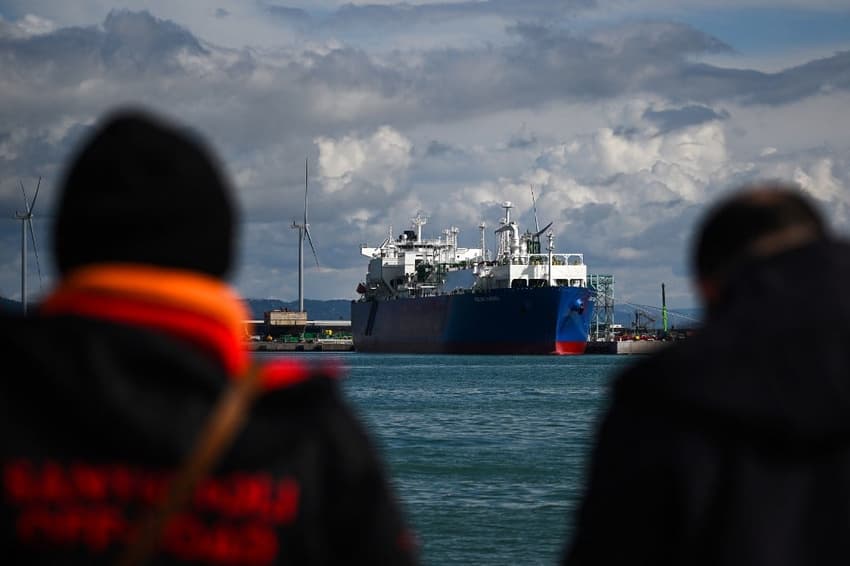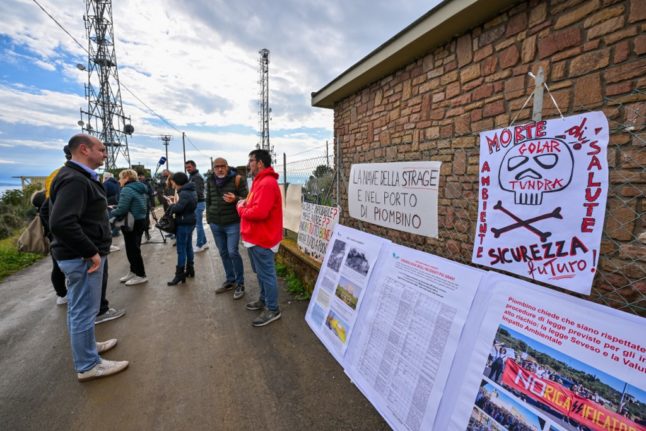Protests in Tuscany as regasification unit arrives

Protests continued in the coastal town of Piombino on Monday, after a new floating storage and regasification unit considered crucial to Italy's energy security arrived overnight.
The arrival of the Golar Tundra, a liquefied natural gas (LNG) tanker which will serve as a floating storage and regasification unit, was greeted with scepticism by many local residents of the Tuscan coastal town of Piombino, in the province of Livorno.
Once installed, the regasifier will receive LNG from other carriers, which it will turn back into a gaseous state that can be fed into Italy's national network.
Stefano Venier, chief executive of Italian gas group Snam, which owns the unit, said earlier this week it would be operational from May.
The project is key to Italy's plan to reduce its reliance on Russian gas following the invasion of Ukraine, which has also seen it sign new deals with partners such as Algeria and Libya.
Former energy minister Roberto Cingolani said last year it was "essential for national security".

Protesters at the port of Piombino, Tuscany, after LNG tanker Golar Tundra arrived overnight from Singapore. The banner reads "The disaster ship is in the port of Piombino". (Photo by Filippo MONTEFORTE / AFP)
The location was chosen so gas can be easily transported to Italy's heavily industrialised north, although the government says it is temporary, and that after three years it will move.
But there have been months of local protests against the project, and a small march was staged Sunday ahead of the vessel's late-night arrival from Singapore.
Opponents say it will pose health and safety risks for those travelling between the port city of Piombino and the island of Elba, a popular holiday destination.
🇮🇹🚢 La FSRU #GolarTundra arriva a Piombino.
Da metà maggio, la capacità di rigassificazione italiana salirà da 16 a 21 Gmc/a.
Praticamente ciò che manca per dire addio alla #Russia. pic.twitter.com/Fl6ZJJGutu
— Matteo Villa (@emmevilla) March 19, 2023
Environmental groups have also warned the project will slow down Italy's transition to renewable energy.
The Golar Tundra can store 170,000 cubic metres of LNG and has an annual regasification capacity of five billion cubic metres, according to Snam.
"Five billion cubic metres of gas allows us to reach levels of self-sufficiency that allows families to think about lower bills," said Tuscany President Eugenio Giani at the port.
Snam said last summer the unit could contribute around 6.5 percent of Italy's needs, bringing national regasification capacity to over 25 percent of demand.
Russia provided around 40 percent of Italy's gas in 2021 but this fell to 16 percent last year, officials say.
Comments
See Also
The arrival of the Golar Tundra, a liquefied natural gas (LNG) tanker which will serve as a floating storage and regasification unit, was greeted with scepticism by many local residents of the Tuscan coastal town of Piombino, in the province of Livorno.
Once installed, the regasifier will receive LNG from other carriers, which it will turn back into a gaseous state that can be fed into Italy's national network.
Stefano Venier, chief executive of Italian gas group Snam, which owns the unit, said earlier this week it would be operational from May.
The project is key to Italy's plan to reduce its reliance on Russian gas following the invasion of Ukraine, which has also seen it sign new deals with partners such as Algeria and Libya.
Former energy minister Roberto Cingolani said last year it was "essential for national security".

The location was chosen so gas can be easily transported to Italy's heavily industrialised north, although the government says it is temporary, and that after three years it will move.
But there have been months of local protests against the project, and a small march was staged Sunday ahead of the vessel's late-night arrival from Singapore.
Opponents say it will pose health and safety risks for those travelling between the port city of Piombino and the island of Elba, a popular holiday destination.
🇮🇹🚢 La FSRU #GolarTundra arriva a Piombino.
— Matteo Villa (@emmevilla) March 19, 2023
Da metà maggio, la capacità di rigassificazione italiana salirà da 16 a 21 Gmc/a.
Praticamente ciò che manca per dire addio alla #Russia. pic.twitter.com/Fl6ZJJGutu
Environmental groups have also warned the project will slow down Italy's transition to renewable energy.
The Golar Tundra can store 170,000 cubic metres of LNG and has an annual regasification capacity of five billion cubic metres, according to Snam.
"Five billion cubic metres of gas allows us to reach levels of self-sufficiency that allows families to think about lower bills," said Tuscany President Eugenio Giani at the port.
Snam said last summer the unit could contribute around 6.5 percent of Italy's needs, bringing national regasification capacity to over 25 percent of demand.
Russia provided around 40 percent of Italy's gas in 2021 but this fell to 16 percent last year, officials say.
Join the conversation in our comments section below. Share your own views and experience and if you have a question or suggestion for our journalists then email us at [email protected].
Please keep comments civil, constructive and on topic – and make sure to read our terms of use before getting involved.
Please log in here to leave a comment.